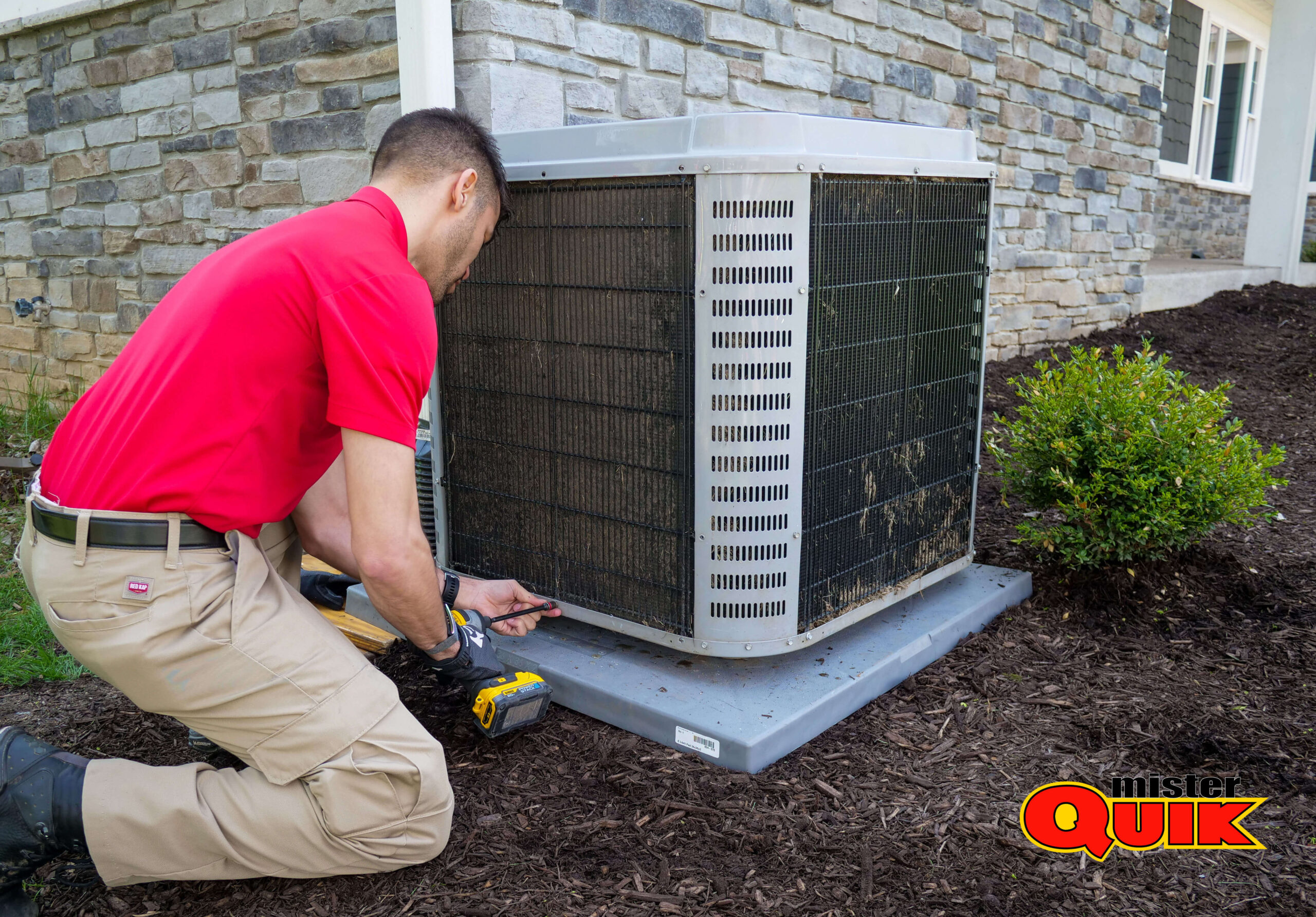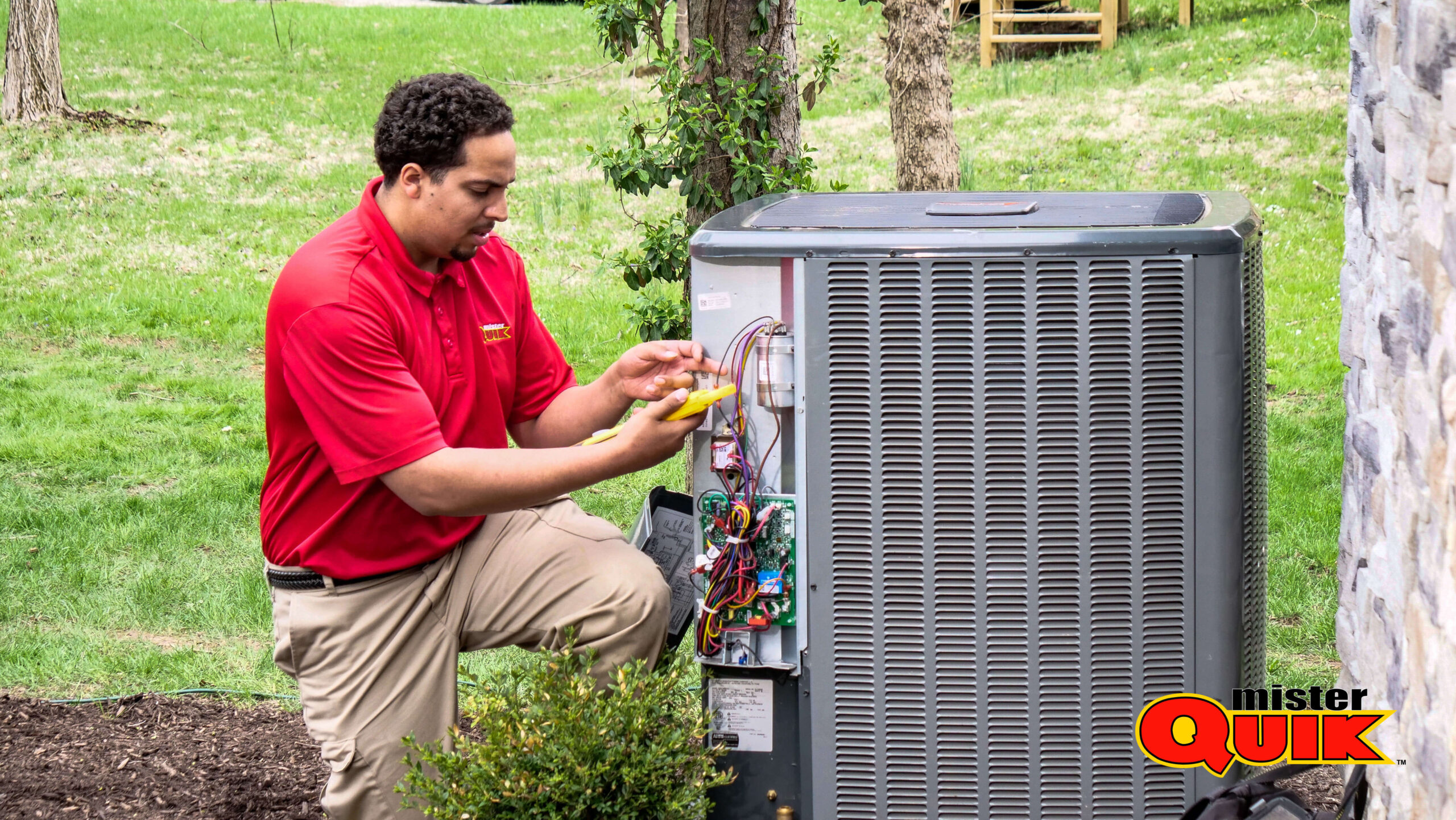Anderson Cooling Replacement
Schedule on your own without making a call. Click the button below to get started!

Weighing the Options: Air Conditioning Repair vs Replacement
When your air conditioner isn’t working correctly, deciding between repair and replacement can be challenging. Let’s break it down:
Air Conditioning Repair:
- Cost: Repairs are generally cheaper upfront, especially for minor issues like a faulty capacitor or a dirty filter. However, repeated repairs can add up over time, making it less cost-effective in the long run.
- Quick Fix: Repairing your air conditioner is usually a faster solution compared to replacement. It’s ideal for addressing immediate issues and getting your system back up and running.
- Suitable for Minor Problems: If your air conditioner is relatively new and experiencing minor issues, repair might be the best option. It can extend the life of your unit and delay the need for replacement.
Air Conditioning Replacement:
- Long-Term Investment: Anderson Cooling Replacement involves installing a new air conditioning system. While it’s a bigger upfront investment, it can save you money in the long term by reducing repair costs and improving energy efficiency.
- Efficiency: Newer air conditioners are more energy-efficient, leading to lower utility bills and reduced environmental impact. Replacement with a high-efficiency unit can improve comfort and save you money on energy bills.
- Reliability: Older units are more prone to breakdowns and may struggle to keep your home cool efficiently. Anderson Cooling Replacement provides a reliable, long-term solution, giving you peace of mind.
In summary, while repairs offer a quick fix, Anderson Cooling Replacement provides long-term benefits such as improved efficiency, reliability, and cost savings. If your air conditioner is old, inefficient, or experiencing frequent breakdowns, replacement may be the better option.
Signs That You Need Air Conditioning Replacement
Is your air conditioner acting up? Here are signs it might be time for a replacement:
If your AC is over 10-15 years old, it's likely nearing the end of its lifespan. Older units become less efficient and prone to breakdowns.
Are you constantly calling for repairs? Frequent breakdowns indicate that your air conditioner is struggling and may be nearing the end of its service life.
Have you noticed a spike in your energy bills? Older air conditioners tend to become less efficient over time, resulting in higher energy consumption.
Are some rooms in your home warmer than others? Uneven cooling could indicate that your air conditioner is no longer able to distribute air evenly. Air conditioning replacement allows you to upgrade to a more powerful and efficient system that can maintain consistent comfort throughout your home.
You should consider replacing your air conditioner if it is more than 10 years old, and you should seriously consider replacing the air conditioner if it’s more than 15 years old—as this is the average lifespan of most cooling devices.
Usually, it is a quick fix, but sometimes the failure can be caused by a much bigger problem. The most expensive part of an AC unit to replace and repair is the air compressor.
When considering repairs, there’s a surprisingly simple formula widely used across the HVAC industry for evaluating the best use of your money. Just multiply the unit’s age by the cost of repairs. If the total exceeds $5,000, you’ll want to replace it.
Fall and spring. Those are the two best times of year to replace your HVAC system. After that, any time other than what HVAC companies describe as “peak season” is a pretty good time.
You’ll have to consider your budget and other factors, but in the long run, replacing the entire system at once, rather than a single indoor or outdoor unit, is the best choice. These units are made to interact with one another, and will accrue wear and tear in tandem.
What’s The Cost To Replace An Air Conditioner?
Wondering about the cost to replace your air conditioner? Anderson Cooling Replacement expenses can vary based on five factors:


- Type of Air Conditioner: Different types of air conditioners come with varying price ranges. Central AC systems are typically more expensive upfront due to their complexity, while window units and portable ACs are more affordable options.
- Size of the Unit: The size and cooling capacity of the air conditioner needed for your home affect the cost. Larger units with higher cooling capacities tend to be pricier than smaller ones.
- Efficiency Rating: Higher efficiency air conditioners, with a higher SEER (Seasonal Energy Efficiency Ratio) rating, often come with a higher initial price tag but can lead to long-term savings on energy bills.
- Installation Costs: Professional installation by experienced technicians ensures proper placement and connection of the air conditioner, maximizing its performance and longevity. Installation costs may vary based on the complexity of the job.
- Additional Features: Optional features like programmable thermostats, advanced filtration systems, and smart technology can add to the overall cost of the air conditioner.
Benefits of Replacing My Air Conditioner
Considering replacing your air conditioner? Here are the benefits:


Newer air conditioners are more energy-efficient, reducing your utility bills.
A new air conditioner provides better cooling performance, ensuring consistent comfort throughout your home.
Modern air conditioners come with advanced filtration systems, improving indoor air quality by removing dust, pollen, and other pollutants.


New units typically come with warranties, providing peace of mind and protection against unexpected repair costs


You can choose features and settings tailored to your specific needs and preferences.
How Efficient Is My Current Air Conditioner?
Determining the efficiency of your current air conditioner is crucial for making informed decisions about Anderson Cooling Replacement. Here’s how to assess its efficiency:
1. Age of the Unit
Older air conditioners tend to be less efficient than newer models. If your unit is over 10-15 years old, it may be less energy-efficient and more prone to breakdowns.
2. Energy Bills
Monitor your energy bills over time. A significant increase in cooling costs could indicate decreased efficiency, signaling the need for replacement.
3. Cooling Performance
Evaluate how well your air conditioner is cooling your home. If certain rooms feel warmer than others or if the unit struggles to maintain consistent temperatures, it may be losing efficiency.
4. Maintenance History
Regular maintenance is essential for optimal efficiency. If your air conditioner has a history of frequent repairs or hasn’t been serviced in a while, its efficiency may be compromised.
5. SEER Rating
Check the Seasonal Energy Efficiency Ratio (SEER) rating of your air conditioner. Higher SEER ratings indicate greater efficiency. If your unit has a low SEER rating, upgrading to a more efficient model can lead to long-term savings on energy bills.
6. Humidity Control
Efficient air conditioners effectively control humidity levels in addition to temperature. If you notice excessive humidity or moisture buildup in your home, your current unit may be lacking in efficiency.
By assessing these factors, you can determine the efficiency of your current air conditioner and decide whether Anderson Cooling Replacement is the best option for improving comfort and energy savings in your home.
How Do I Know If I Have A Warranty On My Air Conditioning Unit?
Determining if your air conditioning unit is under warranty is essential, especially when considering Anderson Cooling Replacement. Here’s how to find out:
Start by reviewing any documentation you received when the air conditioner was installed. Look for a warranty certificate or information booklet provided by the manufacturer. This should outline the warranty coverage period and any terms and conditions.
If you can't locate your warranty information, reach out to the manufacturer directly. Provide them with the model and serial number of your air conditioner, which can usually be found on a label attached to the unit. The manufacturer can verify if the unit is still under warranty and provide details on the coverage.
If you had your air conditioner installed by a professional HVAC company like Mister Quik Home Services, they may have records of the warranty information. Contact them and inquire about the warranty status of your unit. They can also offer guidance on how to proceed if the unit requires replacement.
Some manufacturers require you to register your air conditioner online to activate the warranty. If you completed this step when the unit was installed, check your email or records for confirmation of registration. You may also be able to log into your account on the manufacturer's website to view warranty details.
Once you determine that your air conditioner is under warranty, review the coverage details carefully. Note any exclusions or limitations, such as parts versus labor coverage and the duration of the warranty period. Understanding the warranty terms can help you navigate Anderson Cooling Replacement and ensure any eligible costs are covered.
By following these steps, you can determine if your air conditioning unit is under warranty and make informed decisions about repair or replacement. If you need assistance or advice regarding Anderson Cooling Replacement, contact Mister Quik Home Services for expert support tailored to your needs.
Troubleshoot Checklist:
- Check the age of your air conditioner. If it’s over 10-15 years old, it may be nearing the end of its lifespan.
- Monitor your energy bills for any significant increases, which could indicate decreased efficiency over time.
- Assess the cooling performance of your air conditioner. Uneven cooling or frequent breakdowns may signal decreased efficiency.
- Consider the maintenance history of your unit. If it has a record of frequent repairs or hasn’t been serviced recently, its efficiency may be compromised.
- Review any documentation you received during installation for warranty information.
- Contact the manufacturer with your unit’s model and serial number to verify warranty coverage and understand the terms and conditions.
- Reach out to experienced HVAC technicians like Mister Quik Home Services for an assessment of your air conditioner’s efficiency.
- If replacement is necessary, seek advice on selecting a new, energy-efficient unit tailored to your home’s needs.
- Check the Seasonal Energy Efficiency Ratio (SEER) rating of your current air conditioner. Higher SEER ratings indicate greater efficiency.
- Evaluate the humidity control capabilities of your unit. Efficient air conditioners effectively control both temperature and humidity levels.






